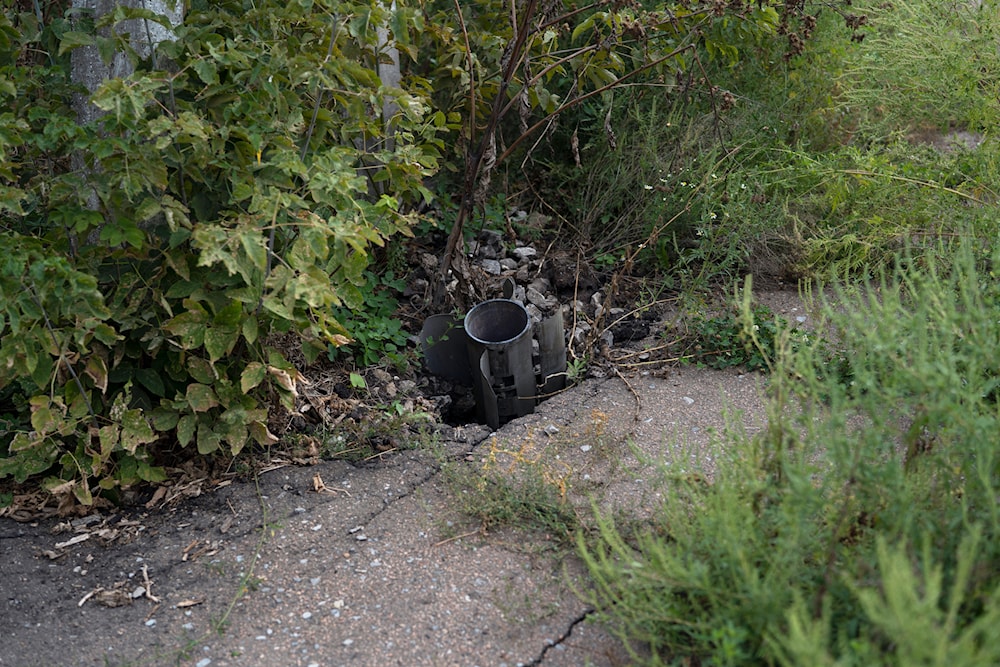Lithuania withdraws from cluster bomb ban treaty amid controversy
Lithuania’s parliament initially approved the withdrawal from the cluster munitions convention last July, but the process required a six-month waiting period after formally submitting exit documents to the UN.
-

A part of a rocket sits wedged in the ground in an area at the Veres farm in Novomykolaivka, eastern Ukraine, on Saturday, September 10, 2022. (AP)
Lithuania officially withdrew on Thursday from an international treaty prohibiting cluster bombs, justifying its decision with security concerns over neighboring Russia, in a move that has drawn sharp criticism from human rights organizations.
The Baltic nation, home to 2.8 million people and formerly under Soviet rule, has also signaled its intent to exit another global agreement banning anti-personnel landmines.
As a NATO member, Lithuania has been ramping up its defenses following the war in Ukraine, fearing it could be targeted next if Moscow achieves its objectives. However, human rights groups have strongly condemned the decision. Amnesty International called it "disastrous," while Human Rights Watch described it as "alarming," warning that it could endanger civilians.
Lithuania’s parliament initially approved the withdrawal from the cluster munitions convention last July, but the process required a six-month waiting period after formally submitting exit documents to the UN. The country is the first to leave the convention since its adoption in 2008 and the first European Union member to withdraw from a multilateral arms control treaty.
Deputy Defense Minister Karolis Aleksa defended the decision, stating, "Russia uses all the instruments available in a conventional war, and this shows that we need to take action to ensure effective deterrence and defence." He told AFP this week that exiting the convention provides Lithuania with the capability to "increase the effectiveness of our defence against large-area targets."
The convention, which includes 112 state parties and 12 signatories, bans the use, production, transfer, and stockpiling of cluster bombs. These munitions scatter bomblets over a wide area upon detonation, with many failing to explode on impact—leaving behind hazards similar to landmines.
'A dangerous trend'
Humanitarian organizations have long opposed cluster bombs due to their enduring risks. Handicap International (HI), a founding member of the global coalition against such weapons, urged Lithuania to reconsider its stance.
"Lithuania's decision paves the way to a dangerous trend as it may encourage other states to reconsider their commitments to humanitarian disarmament treaties, particularly in times of heightened security concerns," said Alma Taslidzan from HI.
She emphasized that "the Oslo Convention has proven to be effective in protecting civilians from this indiscriminate weapon."
In response to concerns over civilian safety, Aleksa assured that Lithuania would implement "all necessary measures" to reduce the risks associated with cluster munitions, including efforts to quickly remove unexploded ordnance after potential military operations.
"Cluster munitions have immense destructive power, and additional attention will be paid to internal rules on their use," he added.
Potential exit from landmine ban
Lithuania is also considering withdrawing from the treaty banning anti-personnel landmines. While its defense ministry and military support the move, government leaders have delayed a final decision, seeking clarity on whether regional allies might take similar steps.
In February, Marius Cesnulevicius, national security advisor to the president, stated that a final verdict could take months. Meanwhile, Finland’s armed forces have been reviewing the potential reintroduction of anti-personnel landmines since last summer, though no decision has been reached.
Adopted in 1997 to eliminate landmines due to their long-lasting impact on civilians, the Anti-Personnel Landmines Convention currently includes 164 state parties.

 3 Min Read
3 Min Read










